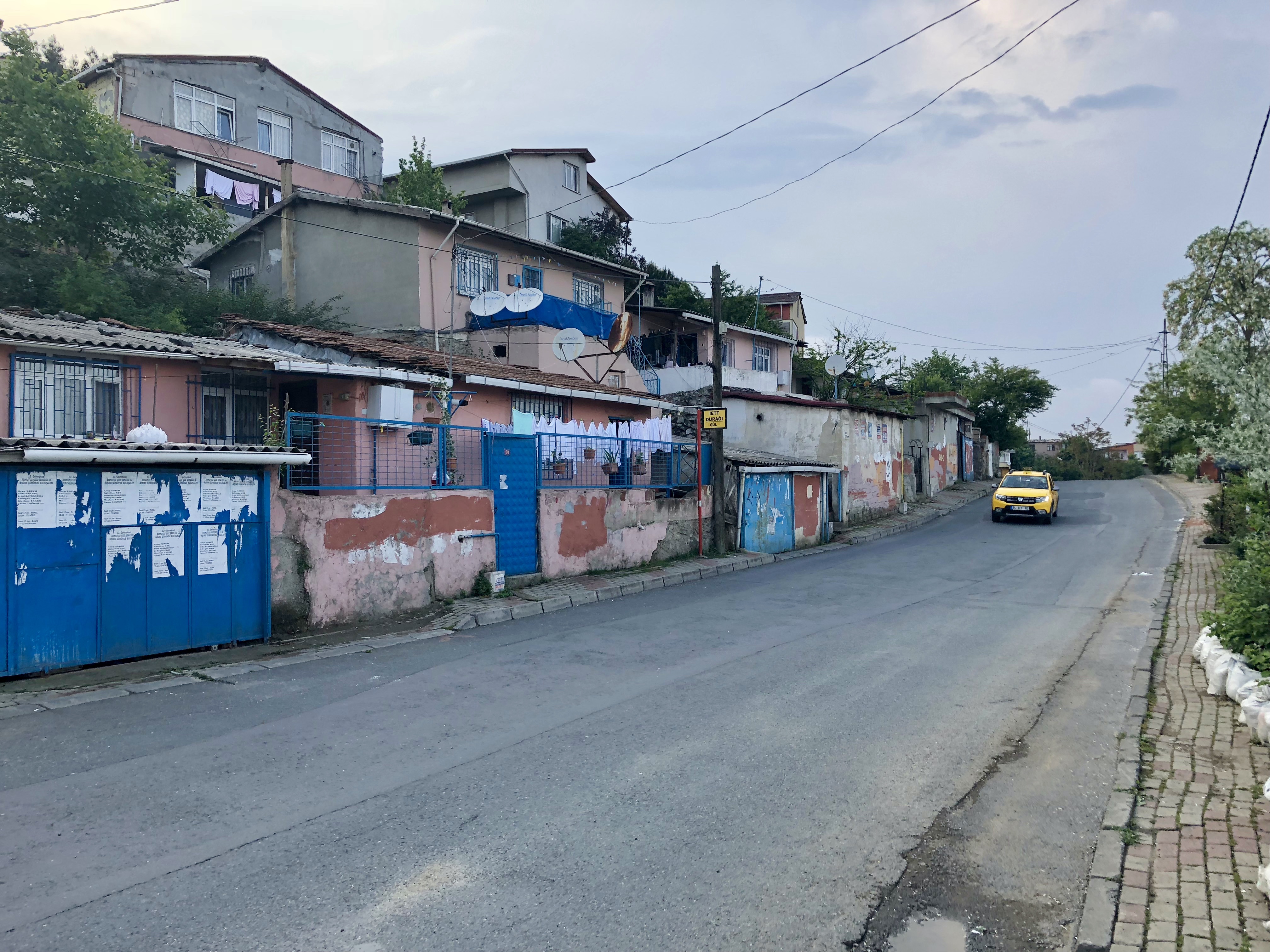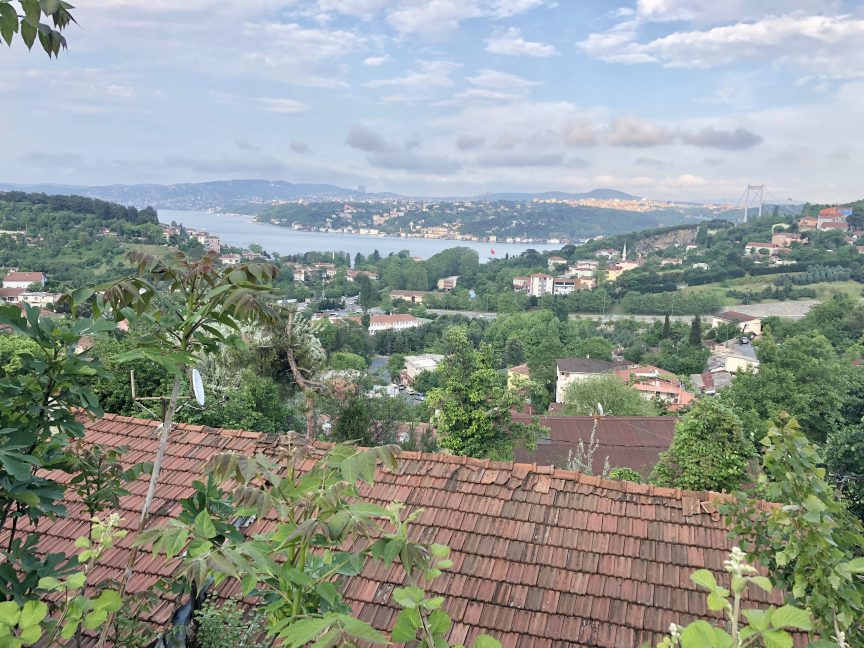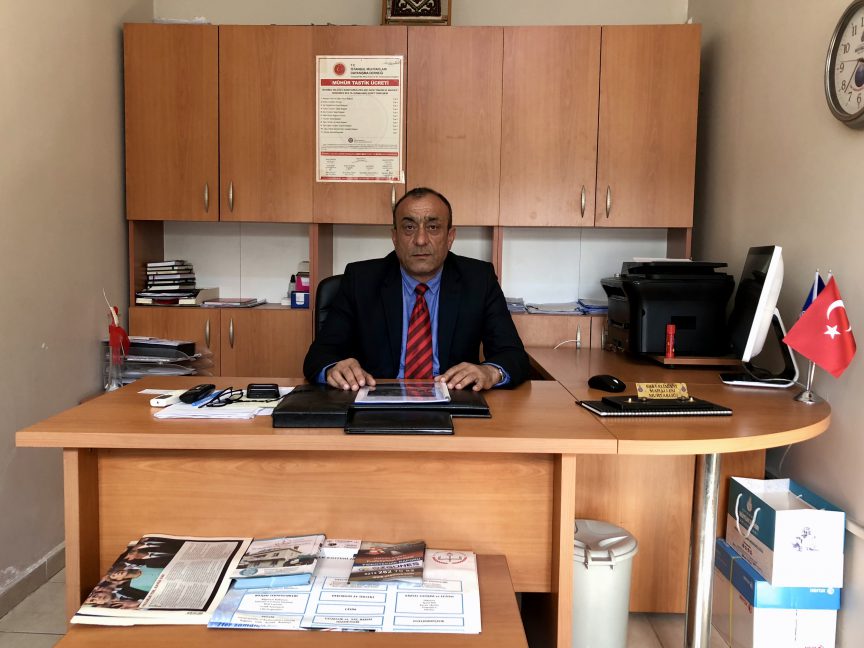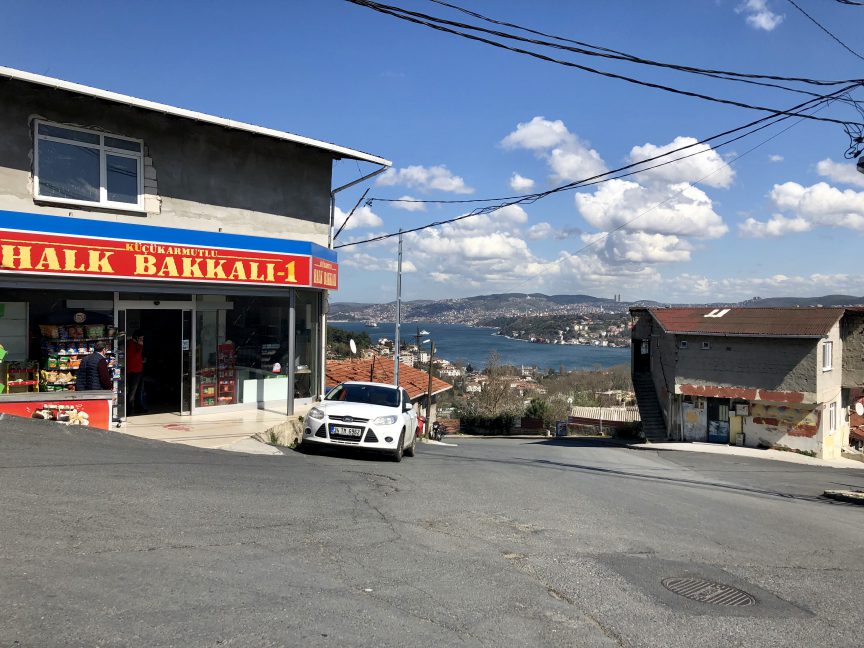Social Cleansing in Istanbul: Residents of Stigmatised Neighbourhood Fight to Stay in Their Homes
by Paul Benjamin Osterlund
19 December 2018

Küçük Armutlu is situated on a hill above Istanbul, a slice of prime real estate that enjoys splendid views of the Bosphorus strait. Despite being just five miles from the city centre, the neighbourhood has somehow managed to preserve the trappings of village life amid the ever-expanding urban sprawl of Turkey’s largest city. Its single-story cottages with leafy gardens and steep, winding streets provide a stark contrast to the glittery skyscrapers and luxurious residences that have popped up almost everywhere else in the city.
But the neighbourhood is under threat. Established primarily during the 1980s by migrants from Anatolia seeking a better life, Küçük Armutlu’s residents have fought for years to stay on the land on which they’ve built their modest homes, even though they don’t technically own it.

Despite its idyllic setting, Küçük Armutlu is a stigmatised area, home to the working class poor, religious minorities, leftists and dissidents. For several years, it has been the target of redevelopment by the government acting under the pretext that it faces the risk of serious damage from a future earthquake – a claim based on little and disputed evidence.
A typical gecekondu, a phrase meaning ‘built overnight’ quarter, Küçük Armutlu was declared a ‘risky area’ in 2012, a designation applied to neighbourhoods determined to be susceptible to damage in the event of a serious earthquake, which seismologists believe will hit in Istanbul within the next several decades.
That declaration was thrown out by a high court in 2012, but Küçük Armutlu was again officially pronounced to be an at-risk area in 2016, and last year the Ministry of Environment and Urban Planning published details of a plan to redevelop the neighbourhood on its website, one that would result in the demolition of Küçük Armutlu and inevitable displacement of its inhabitants.
Many residents believe the earthquake risk is an excuse for social cleansing, and is consistent with a pattern of discrimination against them by city authorities.
Küçük Armutlu is home to a high number of Alevis, who adhere to a heterodox belief system and make up around 15% of the country’s population, though they are not recognised as an official religious group. They face systematic discrimination and were the victims of several massacres throughout the 20th century, and the urban neighbourhoods where they reside are the sites of regular police raids. While Küçük Armutlu residents hold partial deeds that grant them certain rights, allowing access to utilities and enabling them to benefit from municipal services, the actual owners of the land are a local public university, the city municipality and the national treasury.
At the beginning of 2018, leaders of the two neighbourhoods that comprise Küçük Armutlu filed a lawsuit on behalf of thousands of residents in a regional administrative court to cancel the ministry’s project. They argue that the project is not in the greater good of the public and simply seeks to take advantage of the prime location and stunning views to profitably redevelop the area. The lawsuit is ongoing.
“Our neighbourhood doesn’t exist within this project,” said Ali Haydar Aslan, the elected head of neighbourhood affairs of Baltalimanı, one of Küçük Armutlu’s two quarters.
“[The authorities] say, ‘if you want, you can purchase one of the new homes that will be built’, but because the people here are poor, they are unable to.”

According to Aslan, the initial risk declaration was tossed out in court after it was proven by engineers that the land on which Küçük Armutlu sits is solid, but that the current decision was made based on the claim that the neighbourhood’s housing stock itself is prone to damage in the event of an earthquake.
The people of Armutlu are determined to stay in their homes and preserve the community that would be jeopardised if they were evicted. Despite the pressure they are under, the people of Küçük Armutlu manage to maintain close-knit ties that defy the realities of modern urban life in much of Istanbul, where the proliferation of gated communities limits human interaction.
“Around here everyone knows each other, young and old and in between. When a funeral takes place, everyone shows up. When someone gets in an accident, everyone knows about it. Whatever life is like in an Anatolian village, that’s how it is here,” said Aslan.
Residents dispute the idea that their houses would fare worse in an earthquake than buildings elsewhere in the city, citing the 1999 earthquake which killed thousands and resulted in heavy damage in parts of Istanbul and in neighbouring cities, but which did not harm Küçük Armutlu. Local activists have criticised certain at-risk declarations for being convenient excuses for the government to demolish slum neighbourhoods, and researchers are concerned that the application of the law may even be counterproductive.
“I think the lack of transparency around the implementation of the disaster law has had a corrosive effect on Istanbul’s ability to deal with the very real problem posed by earthquake risk,” said Elizabeth Angell, a PhD candidate in anthropology at Columbia University, working on a dissertation about earthquake anticipation in Istanbul.
The threat is severe, as some seismologists estimate that the earthquake’s magnitude will exceed seven on the richter scale. The ensuing destruction is certain to be widespread.
“Just because a building wasn’t visibly damaged in 1999 doesn’t mean it’s safe, and given the long history of corruption in the construction sector in Turkey, it’s not just gecekondu areas that are at risk,” Angell added.
In the Ministry of Environment and Urban Planning’s report, plans indicate that the transformation project aims to double the amount of open and green space in Küçük Armutlu, though it also details plans for five-storey apartment buildings to replace the area’s single, double and three-storey homes.
Like a number of Istanbul Alevi neighbourhoods, there is a police substation atop a hill in Küçük Armutlu, and raids are common, and in July, Küçük Armutlu’s cemevi, an Alevi house of worship, was stormed and ransacked by police.
“The police raid may be understood in relation to the urban transformation project that aims at moving residents out of Küçük Armutlu and transforming this working-class neighbourhood into an affluent residential area,” said Deniz Yonucu, a social anthropologist and visiting professor at the Ludwig Maximillian University in Munich.
“It may also be understood within the context of politics of fear. Turkey’s ruling elites have always instrumentalised sectarian fears and sentiments to maintain control over the population at the times of governmental crisis,” Yonucu said.
In 2000, activists in Küçük Armutlu launched what they called a ‘death fast’ in protest of major changes to the country’s prison system that involved converting dormitory-type cells into more isolated spaces. Many fasted until they died, and in 2001 police raided several houses in the neighbourhood hosting the strikers.
In a SWOT analysis from the ministry’s report, the “bad reputation of the area” is included in a section listing the neighbourhood’s “weak attributes”. The 2000 hunger strikes were referenced in this section of the report as having contributed to this reputation. It also claims that the crime rate began to increase in the early 2000s.
The ministry did not respond to a request for comment.

In 2015, a 25-year-old woman named Dilek Doğan was shot and killed in her home in Küçük Armutlu by a police officer after she requested that he put plastic covers over his shoes. The officer was sentenced to six years in prison in 2017.
The target of the frequent police raids is usually the outlawed Revolutionary People’s Liberation Party/Front (DHKP-C), a militant organisation that maintains a presence in Küçük Armutlu, a fact quickly understood from the ubiquitous slogans spray-painted on walls throughout the neighbourhood. In September, a suspected member was killed during a shootout with police during a raid on the group. But operations such the one conducted against the cemevi has Alevis feeling like they are the ones being earmarked.
“This raid was conducted for the purposes of defaming cemevis. It was aimed at our beliefs and at our neighbourhood,” said the cemevi’s chairwoman, Zeynep Yıldırım in a statement shortly after the raid. Yıldırım was subsequently arrested and remains behind bars as of October, according to Aslan. The reason for her arrest is still unknown.
The battered lira and ensuing economic downturn may delay demolitions in Küçük Armutlu as construction companies are running out of money, and the government has stated it will be scaling back on future projects. Turkey’s economic crisis may be a silver lining for Küçük Armutlu’s residents as well as those of similar areas earmarked for transformation.
But even if the bulldozers do arrive, Küçük Armutlu’s inhabitants aren’t inclined to give up their homes and prime location without a fight. They have held numerous demonstrations to that effect, and have remained outspoken in their criticism of the planned project. The neighbourhood already has one legal victory under its belt, with the 2012 risk declaration being overturned. However, they are living on land they do not own, and the government can ultimately move forward with its project when it sees fit.
“They’re going to kick out the poor people and replace them with villas and mansions that will be sold to the rich,” Aslan said.
“This isn’t urban transformation. It’s profit generation.”